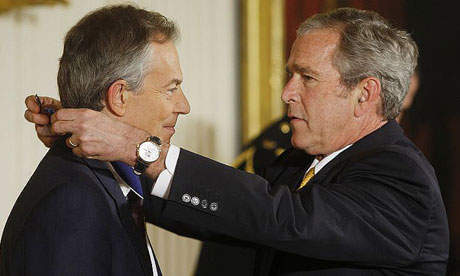Tuesday, December 15, 2009
Comments posted on FACEBOOK:
Ghulam Muhammed As is well acknowledged in knowledgeable circles, the crisis over Dubai debts was orchestrated to milk Abu Dhabi's huge surplus of 750 billions. History repeats itself. British deported Shaikh Shakhbut one fine morning, to pounce on his oil wealth, that he preferred to keep under his huge bed, rather than in the banks. Only after the new Emir was installed that Abu Dhabi was positioned to grow into one of the most modernized enclaves in the Gulf. US/UK/Israel axis will not rest till Abu Dhabi's surplus is wiped out to help their agenda. In the past, Kuwait's 105 billion 'future generation' fund was wiped out helping US fight the first US invasion on Iraq under US President George Bush, the senior. US may start a war on Iran and force Abu Dhabi to pay for it, in 'their best interests'.
Abu Dhabi gives Dubai $10bn to help pay debts | |||||
Dubai's government has announced it has been given a $10bn (£6.13bn) handout from United Arab Emirates neighbour Abu Dhabi to help it pay off its debts. It will use $4.1bn (£2.5bn) of the money to bail out the government-owned investment company Dubai World. The company's property development operation, Nakheel, needed the money to pay investors in an Islamic bond which was due to mature on Monday. The news lifted investor sentiment around the world. Wall Street's Dow Jones ended Monday trading up 0.3% to a 14-month high, while the UK's FTSE 100 added 1%, with banking stocks among the biggest risers. Market boost
News of the payment earlier boosted share markets in the United Arab Emirates. Dubai's main share index closed 10% higher, while Abu Dhabi's rose more than 7%. Meanwhile, the value of both the euro and the pound improved. Both currencies have been unsettled in recent weeks by news of Dubai's debts. But the head of Middle East government ratings at Standard and Poor's, Farouk Soussa, said the bail-out raised questions about government policy in Dubai. "It's a positive in terms of the debt being repaid, it's a positive in terms of support from Abu Dhabi, but I believe the grey shadow cast over this is really the coherence of policy." There had been speculation that Abu Dhabi would have demanded certain assets in return for the money. However, an unnamed Dubai government source, quoted by the Reuters news agency, said this was not the case. "There are no conditions. This is a government-to-government fund, the terms of that fund are internal to the government of Abu Dhabi and Dubai." 'Crucial' lifeline The payment that was due on Monday was an Islamic - or sukuk - bond, designed to be compliant with Islamic law which prohibits interest payments. There had been fears the Nakheel would not be able to pay off the bonds when they matured and analysts say Abu Dhabi's bail-out came as a surprise. Dubai's fellow emirate has helped its neighbour out before. Their relationship is close, as both are part of the seven-member UAE. Their ruling families are from the same tribe. But unlike Dubai, whose economy is largely a service sector one, Abu Dhabi has substantial oil reserves.
On 25 November, Dubai's government had said it would ask its creditors for a freeze on Dubai World's $26bn (£16bn) debt repayments. In a statement earlier on Monday the chairman of Dubai's Supreme Fiscal Committee, Sheikh Ahmed bin Saaed al-Maktoum, said: "The government of Abu Dhabi has agreed to fund $10bn to the Dubai Financial Support Fund that will be used to satisfy a series of upcoming obligations on Dubai World." He added: "We are here today to reassure investors, financial and trade creditors, employees, and our citizens that our government will act at all times in accordance with market principles and internationally accepted business practices." He also announced the implementation of new bankruptcy law. "This law will be available should Dubai World and its subsidiaries be unable to achieve an acceptable restructuring of its remaining obligations," he said. John Sfakianakis, the chief economist of Banque Saudi Fransi-Credit Agricole, in Riyadh, called the handout a "crucial and essential lifeline". He told Reuters: "That should bring in a lot of confidence, basically Abu Dhabi is footing the bill. "It will take time for the implications to unfold. I highly doubt this kind of money has no strings attached." Fahd Iqbal, the Gulf region strategist for EFG-Hermes, said the latest development did not necessarily change the "longer-term outlook". He added his investment banking firm still had other concerns regarding the "hit in confidence" Dubai had experienced, Reuters reported. | |||||
 Reply Reply |  Reply to all Reply to all |  Forward Forward |





